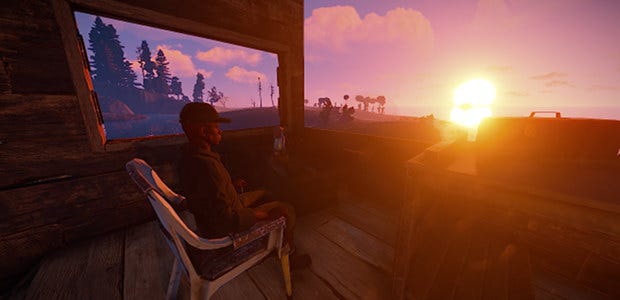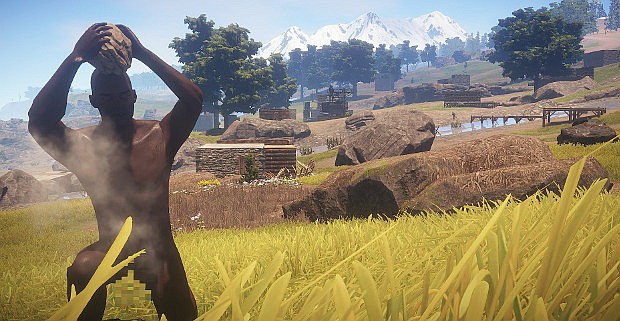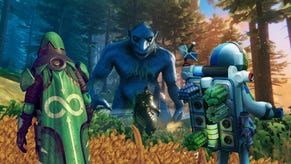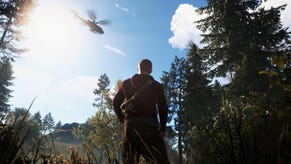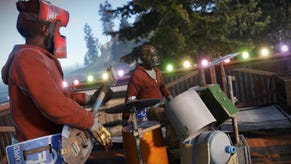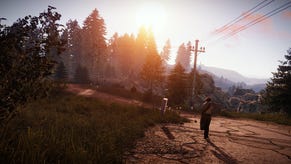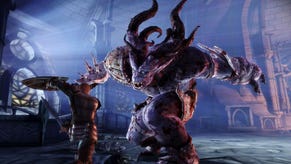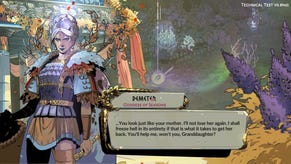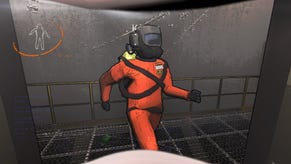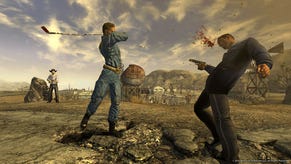Nasty, brutish and short - Rust and the state of nature
The rule of Rust
Facepunch’s violent, vile Rust isn’t an obvious starting place to learn about philosophy. You might explore virtue ethics with the Ultima series, or free will with Bioshock, or concepts of self and moral worth with Soma. Even when looking at political philosophy, you’d perhaps be more inclined to stop by the totalitarian bureaucracy of Paper’s Please, or Crusader Kings II’s massive variety of governmental forms, or Eve Online’s+ unique democracy/tribalism.
But Rust…? Rust, a primitive world of dingly-dangly dongs and caved-in skulls? A transient land of ramshackle fortresses and roving gangs of hostile thugs? What can we hope to learn from that?
To get an inkling of an answer, we need to look more closely at what Rust is. In Rust, life is nasty, brutish and short. Players are born naked and impoverished into a world full of other humans. Every player starts with a rock, which can be used for gathering scarce resources or cracking other player’s skulls.
Normally, a new player will be killed fairly soon. Not by the game’s hostile wildlife or by starvation or thirst or cold, but by another player. Mostly players kill each other in pursuit of any resources they may have gathered. Sometimes players just kill each other because they can, or to remove competition for recurring local resources. From the word go, your fellow players are both an economic and physical threat to you. Cooperation to improve your situation is plausible and rewarding, but the necessary trust is hard to acquire.
In that sense, it parallels an old philosophical concept - that of the ‘state of nature’, the putative starting point where mankind’s society was formed. First posited by the Dutch jurist Grotius (Hugo de Groot), it posits that mankind started as individuals or small groups attempting to live off the land, who had a natural right to self-preservation; but that without the rule of law they came under threat from other violent humans.
In that picture of groups and individuals struggling to survive in harsh conditions, in competition with one another, it is easy to see a reflection of Rust. However, the connection to the social contract runs deeper. In a server-based multiplayer game like Rust, the social contract is present as an actual contract - the End User License Agreement (EULA).
This agreement to a set of rules laid down by a higher authority has something in common with Thomas Hobbes’ position regarding the state of nature and the social contract.
Hobbes had survived the English Civil War and seen the static, hierarchical society of 17th century England - which had survived the religious troubles of the 16th century relatively intact - collapse into roving battles between armed bands, with the king executed for treason by parliament, whilst the poor of the country scrabbled a living from the dirt in between the depredations of passing soldiers. For a current pop culture touchstone, think Game of Thrones.
Given that background, it’s not surprising that Hobbes took a more negative tone when considering Grotius’ state of nature. Hobbes agreed that people had a natural right to protect themselves - against each other and against the sorts of cynical monarchs Niccolò Machiavelli had advocated. However, he specified that, in the state of nature, there is anarchy and misery - that life is “solitary, poor, nasty, brutish and short” - and that the fear of death and of each other passionately motivates the people to improve their situation, which impels them towards a new idea. That idea is a new type of ‘social contract’, which involves transferring all of the people’s power to a sovereign, who makes the law, and enforces it with a monopoly of violence. It’s an irrevocable deal.
In Rust, that could manifest as the people on a server agreeing to give just one man all their weapons - or, perhaps, more reasonably, buying a game key and signing a license agreement as part of the installation process in which they agreed to abide by the developer’s terms and conditions in return for access to the game, and an understanding that the developer can alter or restrict their level of access at any time, in order to protect the experience of all players.
The EULA.
However, some gamers don’t abide by the EULA. They cheat. They hack. They rebel. “Rust is a game that requires time and effort to ‘succeed’ in.” says Craig Pearson, an ex-RPS writer, now at Facepunch. “Servers currently last for a month, so when you hack to gain advantage, you can destroy days or even weeks of work. Hackers can see through walls, aimhack, and see a huge amount of game data, like where resources are, if they’re being watched by another player, or where things are buried.” Get caught and the absolute power of the developer ejects them from the game.
These gamers seem to be following a diferent interpretations of the social contract and state of nature - that of John Locke, a contemporary of Hobbes. Locke disagreed with Hobbes’ characterisation of the social contract and felt that the state of nature was more of an ideal state, like a co-operative farming game, such as Harvest Moon (Amccus, 1996) or Stardew Valley (ConcernedApe, 2016). Here people were naturally free and equal, and used their reason to understand what their purpose was in life. In this model, people chose to enter a political society via a social contract to avoid those occasions when the ideal state would degenerate into power struggles and theft - and hence to maintain their natural rights.
Crucially, Locke argued that to give a ruler absolute authority would be an act of self-destruction on the part of the population, who would be submitting themselves to the jaws of “lions” in order to avoid “what mischiefs may be done to them by polecats or foxes”. The liberal Locke felt that if that the government went against their goods and rights, then the people have the right to tear up the rulebook - a justified revolution that would involve civil war and violence.
In the context of games, this refusal to be devoured by lions could be interpreted as an unspoken agreement between players that if the developer works against their interests, they can breach that EULA.
In Rust, each server resets on a monthly basis. Building a society in this hostile context is a challenge. Hackers attempt to mitigate that, and they’re not alone - non-hackers work consistently alongside them. Each time there’s a monthly reset of their in-game progress, these identifiable groups of players regroup quickly, often hacking to speed up their initial building and development. These larger numbers of players have made their own choice about this social contract - and chosen to quietly dissent, if not outright revolt. If caught, these collaborators face a mere server ban - whilst the outright-banned hackers will sign up with a new Steam account, and they all regroup on another server.
What can we learn then, from Rust? It is the closest analogy to the state of nature games have. To emerge from the state of nature, to enjoy the game to its fullest extent, players must form societies. But Rust's power structure works against that. The game's authority - the developer - resets the servers on a monthly basis. So some players rebel. They hack and collaborate with hackers to have societies that last a little longer, that are more dominant, that are more advanced. And this society escapes the game's limitations, continues between server resets, thrives.
Rust gives us a choice, then, between two views of government and of man. There is the Hobbesian view that man is fundamentally bestial and requires restraint by an absolute force - that Rust’s hackers require suppression by the developers to ensure the game is enjoyable for all. Or there is the Lockean view, that man is naturally sociable, and that they should dissent with and perhaps overthrow leaders who are a net-drain on their happiness and freedoms - as Rust’s hackers and their wider communities do, by rejecting the constraints of the monthly server resets, and moving as coherent groups amongst the game’s servers.
It’s arguable that this difference of opinion on the fundamental nature of humanity, between Hobbe’s solitary and bestial man and Locke’s sociable and pacifistic man, persists today in the conservative and liberal political movements in many countries. There are other ideologies, of course, such as socialism, marxism, and neoliberalism, which have displaced liberalism to a degree, and have different conceptions of what it is to be a moral man in society. And other games, like A Tale In The Desert, Papers Please, and Eve: Online, which are rich explorations of them. But that’s a discussion for another time.
Dan Griliopoulos is a writer. He used to write tons of stuff for RPS, and he’s also worked as a co-writer with Alec on various games. He’s currently Lead Content Editor at massive simulation firm Improbable. He also loves philosophy and has co-authored Ten Things Video Games Can Teach Us: (about life, philosophy and everything) with Jordan Erica Webber.
